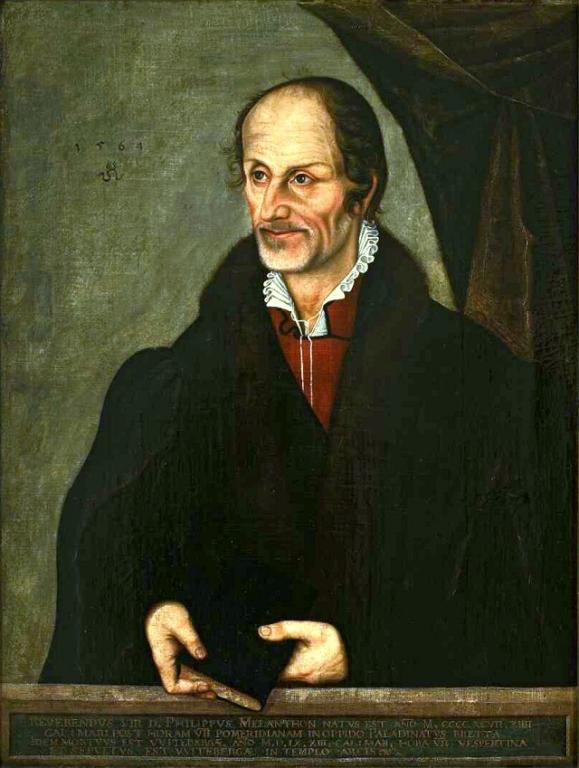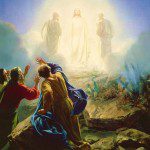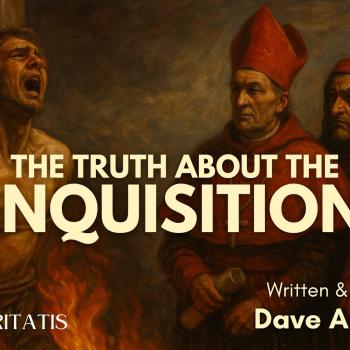He Later Denied the Real Presence Himself

Philip Melanchthon (1497-1560) was a compatriot of Martin Luther, author of the Augsburg Confession, and Luther’s successor. He was, then, one of the major Protestant so-called “reformers.”
Preserved Smith: The Social Background of the Reformation, New York: Collier Books, 1962 (2nd part of author’s The Age of the Reformation, New York: 1920). Smith (died: 1941) was a professor of history, who taught at Cornell and Harvard. He was an expert on the 16th century, and wrote other books like The Life and Letters of Martin Luther (1911), and Erasmus: A Study of His Life, Ideas and Place in History.
A regular inquisition was set up in Saxony [in the 1530s], with Melanchthon on the bench, and under it many persons were punished, some with death, some with life imprisonment, and some with exile.
. . . Melanchthon was far more active in the pursuit of heretics than was his older friend [Luther]. He reckoned the denial of infant baptism, or of original sin, and the opinion that the eucharistic bread did not contain the real body and blood of Christ, as blasphemy properly punishable by death. He blamed Brenz for his tolerance, asking why we should pity heretics more than does God, who sends them to eternal torment? Brenz was convinced by this argument and became a persecutor himself. (p. 177; my italics)
We know (from various historians) that Melanchthon, with Luther’s approval and sanction, held that heretics who denied infant baptism, original sin, and the Real Presence in the Eucharist should be put to death. This is a matter of historical record. This is not in dispute at all. One can only quibble endlessly about what real presence means.
Did Melanchthon later change his mind on the Eucharist and deny that the Body and Blood of Jesus were truly, substantially present in it, even in the Lutheran sense of consubstantiation? Yes, and this is also rather easily established. It is quite arguably sufficient, in fact, to consult just one work: well-known Melanchthon biographer Clyde L. Manschreck‘s translation and edition of the “reformer’s” systematic theology: Loci communes theologici (1555 edition: Grand Rapids, Michigan: Baker Book House, 1965; my paperback edition dates from 1982 and is called Melanchthon on Christian Doctrine).
I also have the earlier 1521 edition of Loci communes theologici (edited by Wilhelm Pauck, Philadelphia: The Westminster Press, 1969), but the later edition is important because it can illustrate Melanchthon’s ever-evolving doctrine of the Eucharist. Furthermore, the Preface by Manschreck himself (author of Melanchthon: The Quiet Reformer, New York: Abingdon Press, 1958), tells us just about all we need to know on the matter, right from perhaps the leading authority on Melanchthon in recent times. I shall cite the Preface below.
Remember, Melanchthon advocated the death penalty in 1530 and 1536 for the denial of the Real Presence, then later denied it himself in terms of what I would argue was the clear historical meaning of that term, held even by Luther (though in a way different from transubstantiation). While he didn’t later adopt a purely symbolic view, on the other hand, he had forsaken the doctrine of a physical, substantive presence of the Body and Blood of Christ in the consecrated bread and wine.
[Note: CR = Corpus Reformatorum, which collects Melanchthon’s works and is the primary source for his materials. It was edited by C. G. Bretschneider and H.E. Bindsell from 1834-1860]
Both humanism and an attempt to draw closer to Calvinism have also been blamed for Melanchthon’s altered views on the Lord’s Supper. This was particularly noticeable in the 1540 changes which Melanchthon introduced into the Augsburg Confession.
. . . Article X of the Augsburg Confession, 1530, read, “Of the Supper of the Lord, they teach that the Body and Blood of Christ are truly present and are distributed to those who eat in the Supper of the Lord; and they disapprove of those who teach otherwise.” In the Variata of 1540 Article X read: “Of the Supper of the Lord, they teach that with the bread and the wine the Body and Blood of Christ are truly tendered to those who eat in the Lord’s Supper.” “Tendered” replaced “distributed,” and the note on disapproval was omitted. At this time the German evangelicals were making overtures to John Calvin, and this change reflects a desire to allow a Calvinistic interpretation of the Lord’s Supper, for Melanchthon himself had come to believe in a real, spiritual presence, which was a drift from the physical, “distributable,” “this-is-my-body” presence held by Luther. As early as 1519 Melanchthon had completely rejected transubstantiation, and by 1544 had eliminated the elevation of the Host in Wittenberg (50). Rationalistic humanism figured in the change; he had been searching the documents of early Christianity. In 1544 Melanchthon was ready to depart from Wittenberg if necessary; he had struggled with the problem for more than ten years (51). Nevertheless, the tension did not result in a break (52).
At the Marburg Colloquy in 1529 Melanchthon was paired with Zwingli and Luther with Oecolampadius in a discussion of the Lord’s Supper, on which the participants agreed to disagree (53). Afterward, Melanchthon’s thoughts on the Eucharist gradually changed, due largely to a dialogue with Oecolampadius in 1530; it shook his confidence in the physical presence, (54), for Oecolampadius demonstrated that the early Church subscribed to both mystic and symbolic views of the Eucharist four centuries before the physical theories became the vogue. After the death of Zwingli and Oecolampadius in 1531 Bucer made overtures for union of the Zwinglians and Lutherans; though they were premature, (55) Melanchthon nurtured strong doubts about the physical presence in which he thought Luther believed. (56) To Melanchthon the presence had become a mystery, analogous to faith. (57) In 1533 Bucer sent Melanchthon a booklet, In Preparation for Union, that held some ecumenical promise, but Melanchthon was not optimistic (58) because he felt bound to present to Bucer (at Cassel in 1534) Luther’s view that “the body of Christ is really eaten in the Supper, that the body is actually torn with the teeth and eaten.” (59) Nevertheless, Bucer and Melanchthon agreed that the body of Christ is given and received at the same time as the elements, that they are sacramentally joined without any natural mixing of their substances. (60) Luther agreed for the sake of peace, but Melanchthon had become convinced that his original views were contrary to those of the early Church fathers. (61) In the 1535 Loci he expressed an inward, spiritual communion with Christ as the essential aspect of the Eucharist. (62) . . . Melanchthon doubted that the agreement on words would last; rumors circulated that he was a Sacramentarian. (65)
In 1538 Melanchthon insisted that the sacramental presence was in the use, that Christ was truly present and effective then, the sacramental union being like the union of fire and iron. (66) By 1543 Melanchthon held that the sacramental union lasts only until the Communion is finished; then the elements are again simply bread and wine and mnay be treated as such. (67) When Luther wrote A Short Confession on the Holy Sacrament, Against the Fanatics in the tense year of 1544, Melanchthon expected to be attacked. (68) Instead Luther said, “I have absolutely no suspicion in regard to Philip,” (69) but the Elector nevertheless took the precaution of forbidding Luther to attack Melanchthon. (70) Despite the tension in 1544, Luther’s commendation of ther Loci of 1544-45, which embodied Melanchthon’s views on the Supper, were unstinted. (71) After Luther’s death, February 18, 1546, Melanchthon branded the physical view of the Supper as bread idolatry. (72)
Footnotes:
50 ZKG, XXXII, 292 f.; CR 7:877-89.
51 CR 3:537.
52 CR 5:474.
53 CR 1:1048, 1065, 1098; 23:727.
54 CR 2:217, 822, 824.
55 CR 2:470, 498, 787.
56 Cf. C. Schmidt, Melanchthon (Elberfeld, 1861), 318 f.
57 CR 2:620, letter to Rothmann at Munster, Dec. 24, 1532.
58 CR 2:675, 776; Schmidt, Melanchthon, 318 f.
59 James W. Richard, Melanchthon, the Protestant Preceptor of Germany (New York: 1898), 251; Schmidt, Melanchthon, 319; Martin Luthers Briefe, 4:569.
60 CR 2:807 f.
61 CR 2:824.
62 Cf. Schmidt, Melanchthon, 371.65 CR 2:837; 3:81, 180; Camerarius, De Vita Melanchthonis, 163.
66 CR 3:514.
67 ZKG, XXXII (1911), 292 f.; CR 7:877-88.
68 CR 5:474; Luthers Werke, 32:39 f.
69 Martin Luthers Briefe, 5:645, 697.
70 CR 5:746.
71 Lutheran Quarterly, XXXVI (April, 1916), 68.
72 For views in the 1555 Loci, see Articles XIX, XXII, XXIII.
A. A. Hodge: Outlines of Theology: Pelagianism, Semi-Pelagianism & Augustinianism (italics added):
Luther, a monk of the order of Augustine, and an earnest disciple of that father, taught a system of faith agreeing in spirit and in all essential points with that afterwards more systematically developed by Calvin. The only important point in which he differed from the common consensus of the Calvinistic Churches related to the literal physical presence of the entire person of Christ in, with, and under the elements in the Eucharist. With these opinions of Luther Melanchthon appears to have agreed at the time he published the first edition of his ‘Loci Communes.’ His opinions, however, as to the freedom of man and the sovereignty of divine grace were subsequently gradually modified. After the death of Luther, at the Leipsic Conference in 1548, he explicitly declared his agreement with the synergists, who maintain that in the regenerating act the human will cooperates with divine grace. Melanchthon, on the other hand, held a view of the relation of the sign to the grace signified thereby in the Sacraments, much more nearly conforming to opinions of the disciples of Zwingli and Calvin than generally prevailed in his own Church. His position on both these points gave great offense to the Old Lutherans, and occasioned protracted and bitter controversies. Finally, the Old or Strict Lutheran party prevailed over their antagonists, and their views received a complete scientific statement in the ‘Formula Concordiae’ published 1580. Although this remarkable document never attained a position by the side of the Augsburg Confession and Apology as the universally recognized Confession of the Lutheran Churches, it may justly be taken as the best available witness as to what strictly Lutheran theology when developed into a complete system really is.
. . . The grand distinction of Lutheranism however relates to their doctrine of the EUCHARIST. They hold to the real physical presence of the Lord in the Eucharist, in, with, and under the elements, and that the grace signified and conveyed by the sacraments is necessary to salvation, and conveyed ordinarily by no other means. Hence the theology and church life of the strict Lutherans center in the sacraments. They differ from the high sacramental party in the Episcopal church chiefly in the fact that they ignore the dogma of apostolic succession, and the traditions of the early church.
Philip Schaff: History of the Christian Church, Volume VIII: Modern Christianity: 133. Calvin and the Augsburg Confession. Melanchthon’s Position in the Second Eucharistic Controversy. (italics added):
During the progress of this controversy both parties frequently appealed to the Augsburg Confession and to Melanchthon. They were both right and both wrong; for there are two editions of the Confession, representing the earlier and the later theories of its author on the Lord’s Supper. The original Augsburg Confession of 1530, in the tenth article, teaches Luther’s doctrine of the real presence so clearly and strongly that even the Roman opponents did not object to it. But from the time of the Wittenberg Concordia in 1536, or even earlier, Melanchthon began to change his view on the real presence as well as his view on predestination and free-will; in the former he approached Calvin, in the latter he departed from him. He embodied the former change in the Altered Confession of 1540, without official authority, yet in good faith, as the author of the document, and in the conviction that he represented public sentiment, since Luther himself had moderated his opposition to the Swiss by assenting to the Wittenberg Concordia.
. . . Calvin urged Melanchthon repeatedly to declare openly his view on the points in controversy. In a letter of March 5, 1555, after thanking him for his approval of the condemnation of Servetus, he says: “About ’the bread-worship’ . . . , your most intimate opinion has long since been known to me, which you do not even dissemble in your letter. But your too great slowness displeases me, by which the madness of those whom you see rushing on to the destruction of the Church, is not only kept up, but from day to day increased.” Melanchthon answered, May 12, 1555:
I have determined to reply simply and without ambiguity, and I judge that I owe that work to God and the Church, nor at the age to which I have arrived, do I fear either exile or other dangers.” On August 23 of the same year, Calvin expressed his gratification with this answer and wrote: “I entreat you to discharge, as soon as you can, the debt which you acknowledge you owe to God and the Church.” He adds with undue severity: “If this warning, like a cock crowing rather late and out of season, do not awaken you, all will cry out with justice that you are a sluggard. Farewell, most distinguished sir, whom I venerate from the heart.” In another letter of Aug. 3, 1557, he complains of the silence of three years and apologizes for the severity of his last letter, but urges him again to come out, like a man, and to refute the charge of slavish timidity. “I do not think,” he says, “you need to be reminded by many words, how necessary it is for you to hasten to wipe out this blot from your character.” He proposes that Melanchthon should induce the Lutheran princes to convene a peaceful conference of both parties at Strassburg, or Tübingen, or Heidelberg, or Frankfurt, and attend the conference in person with some pious, upright, and moderate men. “If you class me,” he concludes, “in the number of such men, no necessity, however pressing, will prevent me from putting up this as my chief vow, that before the Lord gather us into his heavenly kingdom I may yet be permitted to enjoy on earth, a most delightful interview with you, and feel some alleviation of my grief by deploring along with you the evils which we cannot remedy.” In his last extant letter to Melanchthon, dated Nov. 19, 1558, Calvin alludes once more to the eucharistic controversy, but in a very gentle spirit, assuring him that he will never allow anything to alienate his mind “from that holy friendship and respect which I have vowed to you …. Whatever may happen, let us cultivate with sincerity a fraternal affection towards each other, the ties of which no wiles of Satan shall ever burst asunder.”
Melanchthon would have done better for his own fame if, instead of approving the execution of Servetus, he had openly supported Calvin in the conflict with Westphal. But he was weary of the rabies theologorum, and declined to take an active part in the bitter strife on “bread-worship,” as he called the notion of those who were not contented with the presence of the body of Christ in the sacramental use, but insisted upon its presence in and under the bread. He knew what kind of men he had to deal with. He knew that the court of Saxony, from a sense of honor, would not allow an open departure from Luther’s doctrine. Prudence, timidity, and respect for the memory of Luther were the mingled motives of his silence. He was aware of his natural weakness, and confessed in a letter to Christopher von Carlowitz, in 1548: “I am, perhaps, by nature of a somewhat servile disposition, and I have before endured an altogether unseemly servitude; as Luther more frequently obeyed his temperament, in which was no little contentiousness, than he regarded his own dignity and the common good.”
But in his private correspondence he did not conceal his real sentiments, his disapproval of “bread-worship” and of the doctrine of the ubiquity of Christ’s body. His last utterance on the subject was in answer to the request of Elector Frederick III. of the Palatinate, who tried to conciliate the parties in the fierce eucharistic controversy at Heidelberg. Melanchthon warned against scholastic subtleties and commended moderation, peace, biblical simplicity, and the use of Paul’s words that “the bread which we break is the communion of the body of Christ ” (1 Cor. 10:16), not “changed into,” nor the “substantial,” nor the “true” body. He gave this counsel on the first of November, 1559. A few months afterwards he died (April 17, 1560).
The result was that the Elector deposed the leaders of both parties, Heshusius and Klebitz, called distinguished foreign divines to the University, and entrusted Zacharias Ursinus (a pupil of Melanchthon) and Caspar Olevianus (a pupil of Calvin) with the task of composing the Heidelberg or Palatinate Catechism, which was published Jan. 19, 1563. It became the principal symbolical book of the German and Dutch branches of the Reformed Church. It gives clear and strong expression to the Calvinistic-Melanchthonian theory of the spiritual real presence, and teaches the doctrine of election, but without a word on reprobation and preterition. In both respects it is the best expression of the genius and final doctrinal position of Melanchthon, who was himself a native of the Palatinate.













